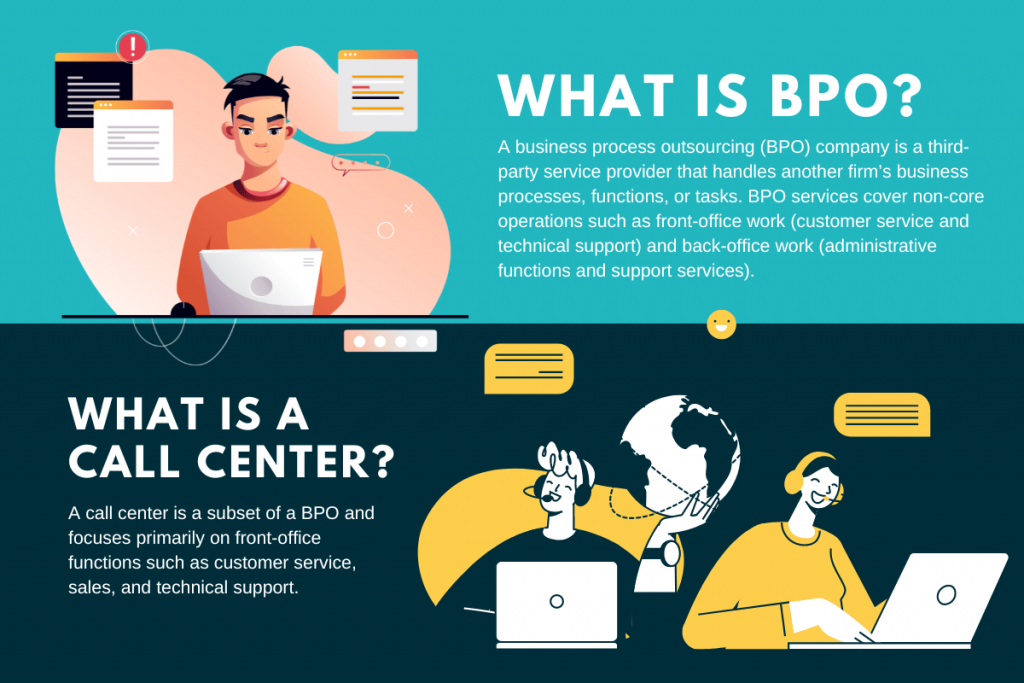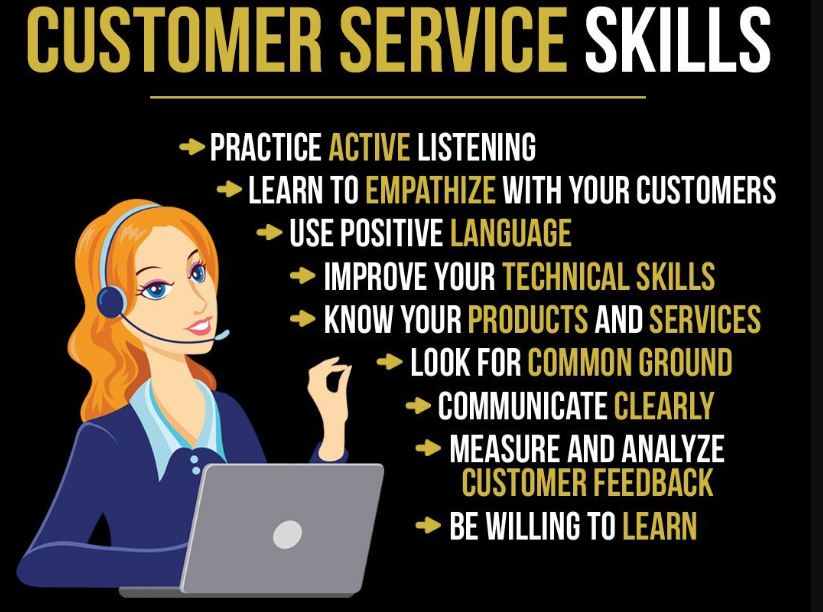Engineering has always been a field of innovation and evolution, offering exciting opportunities for those who choose it as a career path. As a fresh graduate or a college student,…

What Is Customer Service In BPO? – A Detailed Guide For Freshers
As a college student or recent graduate, you might be wondering about career opportunities in the rapidly growing Business Process Outsourcing (BPO) industry. One of the most common entry points into this field is through customer service roles. But what exactly is customer service in BPO, and what does it entail?
This comprehensive guide will walk you through everything you need to know about customer service in the BPO industry, from its fundamental concepts to the skills required and common interview questions you might face.
Understanding BPO and Customer Service
Before diving into the specifics of customer service in BPO, let’s break down these terms:
- Business Process Outsourcing (BPO): This refers to the practice of contracting specific business tasks or functions to third-party service providers. Companies outsource various processes, including customer support, to reduce costs and focus on their core competencies.

- Customer Service: This involves assisting and supporting customers before, during, and after their purchase or use of a product or service. It aims to enhance customer satisfaction and foster long-term relationships.
What is Customer Service in BPO?
Customer service in BPO specifically refers to the outsourcing of customer support functions to specialized service providers. These providers handle various customer interactions on behalf of their client companies, often across multiple communication channels.
Key aspects of customer service in BPO include:
- Multi-channel support: Handling customer queries via phone, email, chat, social media, and other platforms.
- Problem resolution: Addressing customer issues, complaints, and inquiries efficiently and effectively.
- Product/service information: Providing accurate details about the client company’s offerings.
- Order processing: Assisting customers with placing orders, tracking shipments, and managing returns.
- Technical support: Offering guidance on product usage, troubleshooting, and resolving technical issues.
- Upselling and cross-selling: Recommending additional products or services to enhance customer value.
- Customer feedback collection: Gathering and documenting customer opinions and suggestions for improvement.
Role of Customer Service in the BPO Industry
Customer service plays a crucial role in the BPO industry for several reasons:
- First point of contact: Customer service representatives are often the first and sometimes the only human interaction customers have with a company.
- Brand representation: BPO agents act as brand ambassadors, embodying the values and voice of the client company.
- Customer retention: Effective customer service helps build loyalty and reduce customer churn.
- Cost-efficiency: Outsourcing customer service allows companies to reduce operational costs while maintaining high-quality support.
- Scalability: BPOs can quickly scale their customer service operations up or down based on client needs.
- 24/7 availability: Many BPOs offer round-the-clock support, ensuring customers can get help whenever they need it.
- Multilingual support: BPOs often provide support in multiple languages, helping companies serve a global customer base.
Skills Required by Freshers for Customer Service in BPO
To excel in customer service roles within the BPO industry, you’ll need to develop and hone several key skills:

- Communication: Clear and effective verbal and written communication is essential for interacting with customers across various channels.
- Active listening: The ability to fully concentrate on, understand, and remember what customers are saying.
- Empathy: Understanding and sharing the feelings of customers to provide compassionate support.
- Problem-solving: Quickly identifying issues and finding appropriate solutions.
- Patience: Remaining calm and professional, even when dealing with frustrated or angry customers.
- Product knowledge: Thoroughly understanding the client company’s products or services to provide accurate information.
- Time management: Efficiently handling multiple customer interactions while meeting performance targets.
- Adaptability: Quickly adjusting to new processes, technologies, and client requirements.
- Cultural sensitivity: Being aware of and respectful towards cultural differences when dealing with a diverse customer base.
- Stress management: Maintaining composure and productivity in a fast-paced, high-pressure environment.
Types of Customer Service Roles in BPO
The BPO industry offers various customer service roles, catering to different skill sets and experience levels:
- Customer Service Representative (CSR): The most common entry-level position, handling general customer inquiries and issues.
- Technical Support Specialist: Focusing on providing technical assistance and troubleshooting for products or services.
- Sales Support Agent: Assisting customers with product information, orders, and upselling opportunities.
- Social Media Customer Care Specialist: Managing customer interactions and brand reputation on social media platforms.
- Email Support Agent: Handling written customer communications via email or ticketing systems.
- Chat Support Agent: Providing real-time assistance through live chat platforms.
- Quality Analyst: Monitoring and evaluating customer interactions to ensure service quality and compliance.
- Team Leader: Managing a team of customer service representatives and ensuring performance targets are met.
Career Growth For Freshers in Customer Service BPO
Starting a career in customer service BPO can lead to various growth opportunities:
- Vertical growth: Progressing from entry-level positions to team leader, supervisor, and manager roles.
- Horizontal growth: Moving into specialized roles such as quality assurance, training, or operations management.
- Industry expertise: Gaining in-depth knowledge of specific industries served by the BPO, such as healthcare, finance, or technology.
- Skill development: Continuously improving communication, problem-solving, and leadership skills applicable to many career paths.
- International exposure: Opportunities to work with global clients and potentially relocate to international BPO locations.
Challenges in Customer Service BPO for Freshers
While rewarding, customer service roles in BPO come with their own set of challenges:
- High-pressure environment: Meeting performance metrics while handling a high volume of customer interactions.
- Emotional toll: Dealing with frustrated or angry customers regularly can be emotionally draining.
- Shift work: Many BPOs operate 24/7, requiring employees to work non-standard hours, including nights and weekends.
- Repetitive tasks: Some roles may involve handling similar types of inquiries repeatedly.
- Continuous learning: Keeping up with changing products, services, and processes across multiple client accounts.
- Cultural differences: Navigating language barriers and cultural nuances when serving a global customer base.
- Technology dependence: Relying heavily on various software and tools, can be challenging if technical issues arise.
Customer Service in BPO: Interview Questions and Preparation
When applying for customer service positions in BPO, you may encounter the following types of interview questions:
- “How would you handle an angry customer who’s demanding a refund?”
- “Describe a situation where you went above and beyond for a customer.”
Role-specific questions:
- “What do you know about our company and the services we provide?”
- “How comfortable are you with multitasking in a fast-paced environment?”
- “Tell me about a time when you had to deal with a difficult team member.”
- “Describe a situation where you had to learn a new skill quickly.”
- “Are you familiar with CRM software? Which ones have you used?”
- “How would you troubleshoot a customer’s internet connection issues?”
Cultural fit questions:
- “How do you handle stress and pressure?”
- “What motivates you to provide excellent customer service?”
To prepare for customer service in BPO interview questions:
- Research the company and its clients thoroughly.
- Practice common customer service scenarios.
- Prepare examples of your problem-solving and communication skills.
- Familiarize yourself with basic technical terms relevant to the role.
- Be ready to discuss your ability to work in a team and handle pressure.
Future of Customer Service in BPO
The customer service landscape in BPO is continuously evolving, driven by technological advancements and changing customer expectations. Some trends shaping the future of this field include:
- AI and automation: Chatbots and AI-powered tools are increasingly handling routine inquiries, allowing human agents to focus on more complex issues.
- Omnichannel support: Seamless integration of various communication channels for a cohesive customer experience.
- Data-driven insights: Utilizing big data and analytics to personalize customer interactions and predict customer needs.
- Remote work: The rise of work-from-home opportunities in customer service roles, accelerated by recent global events.
- Emphasis on emotional intelligence: Growing importance of soft skills like empathy and adaptability in customer interactions.
- Proactive customer service: Anticipating and addressing potential issues before they become problems for customers.
- Video support: Increasing use of video chat for more personal and effective customer assistance.
Customer service in BPO offers an exciting and dynamic career path for freshers and college students. It provides an opportunity to develop valuable skills, gain exposure to various industries, and potentially grow into leadership roles. While it comes with its challenges, the rewards of helping customers and contributing to a company’s success can be significant.
Stay updated with the latest trends, focus on developing your communication and problem-solving skills, and always strive to provide the best possible service to customers.
FAQs on Customer Service In BPO
What qualifications do I need for customer service in BPO?
Most entry-level customer service positions in BPO require a high school diploma or equivalent. Good communication skills, basic computer proficiency, and fluency in the required language(s) are essential. Some roles may prefer candidates with a bachelor’s degree, but it’s not always mandatory. Relevant certifications can be an advantage.
What is the average salary for customer service representatives in BPO?
The average salary for customer service representatives in BPO varies by location, experience, and company. With experience, salaries can increase significantly. International BPOs may offer different pay scales based on local economic factors.
What are the working hours for customer service jobs in BPO?
Customer service in BPO often involves shift work to provide 24/7 support. Shifts can include early mornings, evenings, nights, and weekends. Many BPOs offer flexible scheduling options. Typical shifts are 8-9 hours long, but this can vary. Be prepared for non-traditional hours, especially when starting.
How can I improve my chances of getting hired in customer service BPO?
To improve your chances, focus on developing strong communication skills, both verbal and written. Gain basic computer proficiency and familiarize yourself with common customer service software. Practice problem-solving scenarios and highlight any relevant experience. Consider getting customer service certifications and learning an additional language if possible.
What are the most common challenges faced by customer service representatives in BPO?
Common challenges include dealing with angry or frustrated customers, meeting performance metrics, adapting to shift work, and managing stress in a fast-paced environment. Other challenges involve continuous learning of new products or services, navigating cultural differences with international customers, and maintaining a work-life balance due to non-standard working hours.
What skills are most important for success in customer service BPO?
Key skills for success in customer service BPO include excellent communication, active listening, problem-solving, and empathy. Patience, adaptability, and the ability to remain calm under pressure are crucial. Time management, multitasking, and basic technical skills are also important. Cultural sensitivity and language proficiency can be significant advantages.
How does customer service in BPO differ from in-house customer service?
Customer service in BPO often involves handling multiple client accounts, requiring adaptability and quick learning. BPO roles may have stricter performance metrics and more standardized processes. They often provide 24/7 support and may involve serving international customers. BPOs typically offer more opportunities for career growth within the customer service field.
What types of companies typically use BPO for customer service?
Companies across various industries use BPO for customer service, including telecommunications, e-commerce, healthcare, financial services, and technology firms. Large multinational corporations often outsource customer support to manage global operations efficiently. Startups and small businesses may also use BPO to scale their customer service capabilities cost-effectively.
How can I advance my career in customer service BPO?
To advance your career, consistently meet or exceed performance targets and seek additional responsibilities. Develop leadership skills and consider pursuing relevant certifications or further education. Look for opportunities to specialize in specific industries or technologies. Network within your organization and be open to lateral moves that can broaden your skill set.
What is the future outlook for customer service jobs in BPO?
The future outlook for customer service in BPO remains positive, with continued growth expected. However, the nature of roles is evolving due to AI and automation. Future jobs will likely focus more on complex problem-solving and high-value interactions. Developing skills in data analysis, AI management, and specialized customer support can enhance long-term career prospects.
Latest Posts
Top Skills in Resume For Freshers – 2026 Detailed Guide
Creating a compelling resume as a fresh graduate can be a daunting task, but it’s also your ticket to landing your dream job. One of the key elements that can…
Step-by-Step Guide: How to Become a Mechanical Engineer
Mechanical engineering stands as one of the most versatile and in-demand engineering disciplines globally, offering exciting career opportunities across diverse industries. For college students and recent graduates in India, understanding…
What is Upskilling? – Meaning, Benefits and Tips to Upskill
Being ahead of the curve is more crucial than ever in the ever-changing world of today. This requires ongoing skill development and technological adaptation. This entails upskilling or reskilling for…
Top 10 Do’s and Don’ts For Your First Job
Looking for a new job can be a daunting task, especially if you’re a fresher. There are so many factors to consider, from the type of job you want to…
Popular Posts
Best CV Formats for Freshers: Simple, Professional & Job-Winning Templates
Creating an effective CV (Curriculum Vitae) is the first step towards landing your dream job or internship as a fresh graduate. Your CV is your initial introduction to potential employers…
100+ Quantitative Aptitude Questions for Placement with Answers
Quantitative aptitude questions play a crucial role in campus placements, competitive exams, and entry-level job interviews. Whether you are preparing for your first job interview, an aptitude test for placement,…
How to Start an AI Career in India: Skills and Future of Work
Artificial Intelligence (AI) is revolutionizing industries worldwide. From automating routine tasks to enabling self-driving cars and intelligent healthcare diagnostics, AI is reshaping the future of work. For college students and…
How to Write Mail for Job Application – Explained
A job application email is a professional email that you send to a potential employer to express your interest in a job opening. It is typically accompanied by your resume…
How to Write a Job Application Letter (With Samples)
When it comes to applying for your first job, making a great first impression is crucial. As a recent graduate, you might feel a little intimidated by the idea of…
